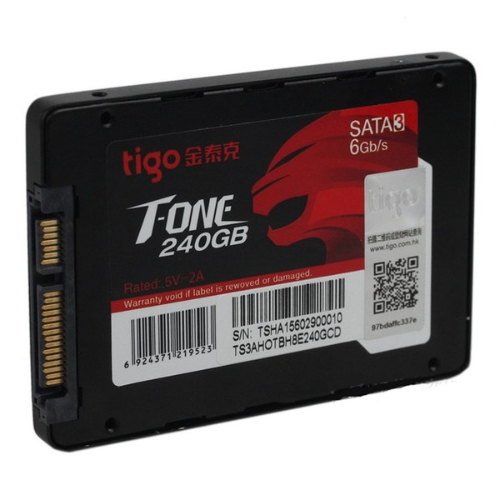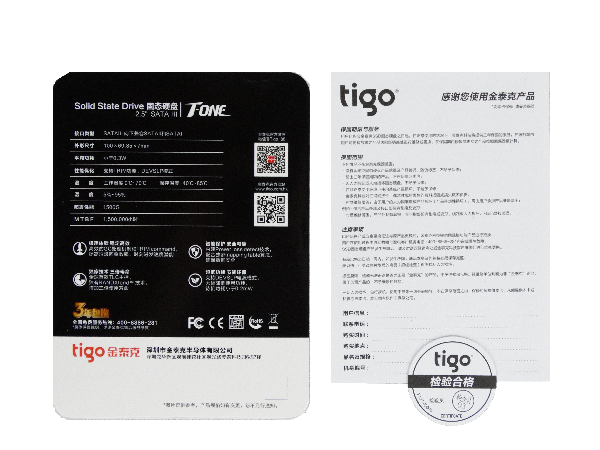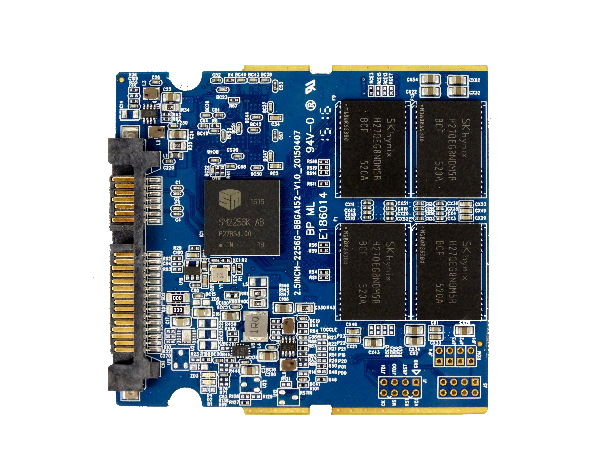Early Verdict
I'm glad we tested the Tigo T-One 240GB SSD, because it allowed us to make a good point about low-cost SSDs. With so much low-cost flash available, these products are already entering the market and showing up on reputable online stores. It's important to remember that these products hold data that can be lost forever. Before you shop based on price alone, you need to decide if losing data is worth the $20 you saved.
Pros
- +
At $60 the 240GB has an attractive price point
Cons
- -
Limited availability outside of China • Low mainstream performance
Why you can trust Tom's Hardware
Specifications, Pricing, Warranty And Accessories
Abundant flash availability, affordably-priced processors and a growing market are encouraging more companies to jump into the SSD segment. Meanwhile, oversupply and low manufacturing costs in Asia make solid-state storage less expensive. Today we're looking at a result of those forces in the form of an entry-level drive from a brand you've never heard of.
Tigo is a division of Tektronix, which was founded in 2000. By 2004, it had become China's largest supplier of memory. Many of the company's products were sold to OEMs and later re-branded. In 2005, Tektronix launched a house brand, Kingtiger, to serve the growing DIY market in Hong Kong and China. In 2011, Kingtiger was re-named Tigo, making it the second-largest supplier of memory products in China and one of the top eight memory suppliers by revenue worldwide in 2013.
Our Tigo sample was hand delivered to us at CES by a company with its own components inside the drive. As far as we know, this model isn't sold in America or Europe yet. But the SSD does allow us to test Silicon Motion's latest SM2256 firmware with SK Hynix's three-bit-per-cell flash.
Specifications
MORE: Best SSDs For The MoneyMORE: Latest Storage News
MORE: Storage in the Forums
Tigo offers the T-One in at a single capacity point: 240GB. It features a Silicon Motion SM2256 controller designed specifically for use with TLC flash, enabling advanced LDPC (error-correction) technology to increase the useful life of low-endurance NAND. You can read more about the SM2256 in our deep dive.
The T-One also uses SK hynix's TLC flash. For years, we rarely found the company's memory on non-hynix SSDs. Over the last six months, however, we've seen a lot more drives shipping with SK hynix NAND. It recently increased flash output and plans to bolster capacity over the next several years. In fact, SK hynix has an advanced NAND factory under construction in South Korea now.
Tigo claims the T-One delivers up to 550 MB/s of sequential reads and 480 MB/s of sequential writes. This nearly matches other drives we've tested based on the same SMI SM2256 processor. The performance differences on paper typically come down to how each company tests to generate their marketing numbers.
Get Tom's Hardware's best news and in-depth reviews, straight to your inbox.
Pricing, Warranty And Accessories
Unit price is what makes the T-One 240GB special. We found the drive available in China for 399 yuan. That comes out to $61 U.S, which is a bit lower than what you'd find something comparable for in North America or Europe.
Tigo backs its T-One with a three-year warranty, but specifies an endurance rating of just 76 TBW. This is a very small value for a high-capacity SSD, though to be fair it matches Samsung's 250GB 850 EVO. Then again, none of the SM2256-controlled products we've tested so far have an explicit terabyte-written endurance rating.
The T-One ships as a bare drive in a blister pack. We didn't find any software packages available on the company's website.
A Closer Look
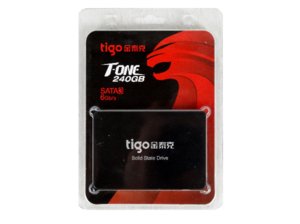
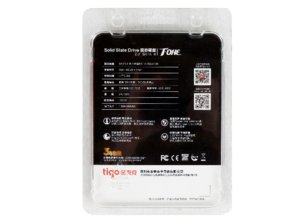
It's amazing to see how much SSD packaging has changed in just a few years. Early drives came with extravagant bundles that included branded screwdrivers, SATA and power cable adapters, and complementary software. Now that the focus has changed from high performance to low cost, SSDs often ship in the same plastic common to SD cards.
The back of Tigo's retail-friendly package lists a few specifications and features.
The two-sided card inside has the paper warranty statement and a quality control tag. Aside from the actual SSD, that's the only accessory you get.
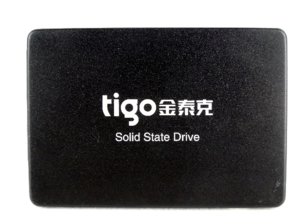
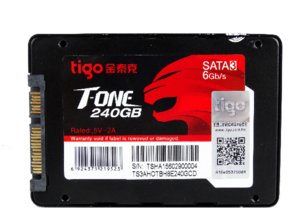
The T-One 240GB's chassis isn't notable in any way aside from the hologram that shows this is a genuine Tigo product.
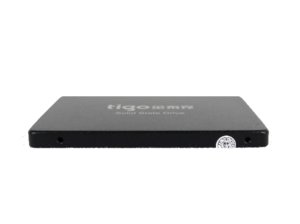
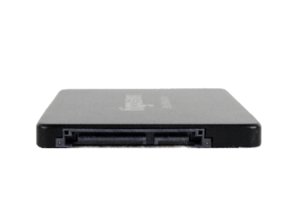
A 7mm enclosure ensures the T-One fits in notebooks that require the thinner form factor. In the future, M.2 will replace 2.5" SSDs. But for now, the two configurations coexist.
Inside, we find the controller paired with Samsung DRAM and eight SK hynix 16nm TLC flash packages. Even more interesting is the printed circuit board that uses metal tabs to hold the drive in place. This is the same design found on most Phison-based SSDs dating back to the S5 controller. We suspect it reduces manufacturing costs because the entire chassis is made from thin, stamped metal and doesn't require screws to keep the PCB secure.
There are a number of components on the board that we don't normally see on low-cost SSDs. The drive can detect power loss events, which accounts for many of the extra surface-mount components.
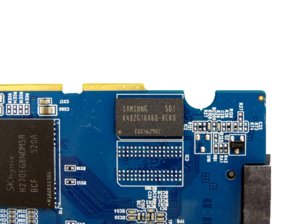
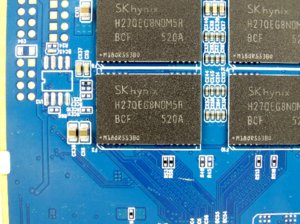
The 16nm SK hynix TLC flash is still fairly uncommon in the wild. In the past, products designed for this market would ship with memory from Micron, and higher-cost models would include Toshiba's Toggle-mode flash. Now that SK hynix is willing to sell NAND to third-party manufacturers, the availability of cheap flash is on the rise.
Current page: Specifications, Pricing, Warranty And Accessories
Next Page Four-Corner Performance Testing
Chris Ramseyer was a senior contributing editor for Tom's Hardware. He tested and reviewed consumer storage.
-
James Mason Would have like to see a price to performance chart to compare all the ones tested.Reply -
darcotech The price of Samsung EVO 850 250Gb is 88.67USD not 149.99. And could be probably found even cheaper.Reply
Buying cheap SSD from non established company is big no for me. My data are on it, and I want to feel safe (even if I have backup). -
joex444 Even if you wanted to spend just $61 on a 240GB SSD, there are other options. PNY, AData, and Kingston all offer 240GB SSDs *lower* than $61. These are all companies that have been around for a good amount of time whereas Tigo is a completely unknown company from China, which tends to be a source of lower quality parts compared to S. Korea, Japan, or Taiwan.Reply -
shrapnel_indie Tektronix is an old U.S. company that still exists. I hope the opening statements were about when Tigo started and not them as Tektronix got its start in 1946.Reply
http://www.tek.com/about-us -
RobinEricsson > Tigo is a division of TektronixReply
Tektronix, as in the electronics test and measurement tool company (http://www.tek.com/ )? Are you sure about that?
It doesn't seem that computer memory and oscilloscopes are closely related. Plus the website of Tektronix's parent company, Danaher, doesn't list Tigo or its worldwide brand Kimtigo as one of the companies in its portfolio (http://www.danaher.com/our-businesses/business-directory ). -
captaincharisma its like every computer related company in the world is selling its own SSD drives nowReply -
mapesdhs I recently tested a Gloway SSD (a model eBay keeps pushing in its "other items like this" listings), easily one of the worst models I've ever come across, terrible write speeds. Definitely avoid.Reply -
rhysiam Your verdict seems a little scare-mongering and introduces a theme which (unless I've missed it) wasn't addressed anywhere else in the review" "you need to decide if losing data is worth the $20 you saved".Reply
What are you basing that on? Have you got data or theory or at least personal experience to back that up?
That line made me go and read the article, assuming I'd find a story of multiple failed drives during your testing process, but I can't see a single sentence about reliability or data retention in the article (correct me if I'm wrong!) You shouldn't really advise your readers to avoid a drive because it'll lose their data if you haven't actually addressed or supported that assertion in the article itself. -
CRamseyer Here is the deal with reliability. The big names in the industry do no cut corners. Samsung, Intel, Micron/Crucial, SK Hynix, Toshiba and SanDisk are the fab companies. They make the flash and they also get first pick when from the production. These companies also know about features in the memory to enable or disable to increase reliability, performance and so on. Most of the extra switches have to do with the ECC (linked to reliability).Reply
I kill SSDs all of the time. It happens so often that I don't even think about it when it happens. Many of the companies send me early drives to test with pre-release firmware. I would estimate that 2 our of every 5 die during testing. Retail products have a much higher success rate. I may kill one in every 60 or so. My testing goes well beyond what anyone would consider normal use so don't let the high percentage take away from buying a new SSD.
When a product review goes live that isn't the end of my testing. At any time I'm developing 3 to 5 new tests for consideration in SSD or NAS reviews. Every once in awhile you will see one of these tests in a regular review to show a corner case problem.
With that said, it's rare for a fab company SSD to fail. I'm not saying they never fail, just the rate is much lower than products from smaller companies. I have around 300 SSDs (maybe more) dating back to 2007 so we are not talking about a small sample size.
Last but not least, I've been in 4 test labs. Two of the companies were fab companies and two were not. The difference is night and day between what the big names in the industry do compared to what the smaller companies do.
That is not to say that I would never use SSDs from smaller companies. I do use them in my lab but when it comes to systems I keep valuable data on, I use fab company drives. -
wh3resmycar ocz trion 100 goes for like $50 here in the philippines (240gb). i use my ssd for games mainly and considering i have a 100MB connection i can afford to have a broken ssd and redownload my whole librabry in a couple of hours.Reply
